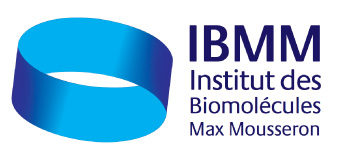Stage 6 mois : CDKs as predictive biomarkers in lymphoma
Groupe Biosenseurs et inhibiteurs de kinases
Keywords : lymphoma, kinase, fluorescent biosensor
Diffuse large B cell lymphoma (DLBCL) and follicular lymphoma (FL) are the most common lymphomas worldwide accounting for 30% and 20% respectively of all non-Hodgkin’s lymphomas (1). In DLBCL, the reported 5-year overall survival rates is 46%. Although considered as an indolent neoplasm the median survival of patients with FL is about 12 years (1) and FL may transform into DLBCL. Furthermore, chemoresistance is a challenge in DLBCL as about one third of patients have either refractory disease or relapse after the initial therapy. Therefore, new prognostic markers and new therapeutic approaches to improve the long-term outcome are needed.
Several cyclin-dependent kinases have been reported to be hyperactivated and contribute to cancer progression in different types of lymphoma, in particular CDK4 and CDK6, for which FDA-approved inhibitors constitute promising therapeutics (2, 3). Transcriptional CDKs such as CDK7 and CDK9 have also been highlighted as pharmacological targets to circumvent resistance (4,5).
We have developed a toolbox of fluorescent peptide biosensors that report on CDK activities and characterized a panel of 40 follicular lymphomas (6). We wish to explore this further in DLBCL in a joint collaboration between Dr. Morris at the IBMM and Dr. Lacheretz Szablewski at the CHU Montpellier.
In this project, the Master student will use the biosensor technology developed by Dr. Morris to characterize and compare CDK activities in different DLBCL cell lines with different genetic backgrounds prior to and following treatment with different drugs targeting these kinases. Moreover, the student will implement biosensors to profile CDK activities in a panel of biopsies derived from patients with DLBCL selected from the CRB-CHU collection, in collaboration with Dr. Lacheretz Szablewski, and investigate correlations with other genetic characteristics and molecular features.
Bibliography
(1 ) Swerdlow SH, E Campo, NL Harris, et al.WHO classification of tumours of haematopoietic and lymphoid tissues (4th edn.), IARC Press, Lyon, France (2017)
(2) Malarikova D. et al. (2024) Cyclin dependent kinase 4/6 inhibitor palbociclib synergizes with BCL2 inhibitor venetoclax in experimental models of mantle cell lymphoma without RB1 deletion. Exp. Hematol. Oncol. 13:34. doi: 10.1186/s40164-024-00499-2
(3) Wang H. et al. The metabolic function of cyclin D3-CDK6 kinase in cancer cell survival. Nature. 2017 546(7658):426-430. doi: 10.1038/nature22797.
(4) Thieme et al. (2023) Mol. Cancer 22(1):64. doi: 10.1186/s12943-023-01762-6.
(5) Morillo D. et al. (2023) Oncotarget. 14:749-752. doi: 10.18632/oncotarget.28473
(6) Royet C, Diot S, Lecki L, Pastore M., Reynes C., Lorcy F, Lacheretzszablewski V, Serre I and Morris M.C (2024) Multiplexed Profiling of CDK Kinase Activities in Tumour Biopsies with Fluorescent Peptide Biosensors ACS Sensors doi:10.1021/acssensors.4c00139
This project will be developed under supervision of Dr. May C. Morris at the Max Mousseron Insitute of Biomolecules (IBMM), in collaboration with Dr. Vanessa Lacheretz-Szablewski, CHU Montpellier. It is funded by the MUSE Biology Health Pole call for Interdisciplinary Master Projects.
Candidates should have experience in cell biology and biochemistry, as well as interest and background in oncology.
Starting date : Jan/Feb 2025
Contact :
Dr. May C. MORRIS, Researcher ID J-5940-2016 / Orcid N° 0000-0001-8106-9728
